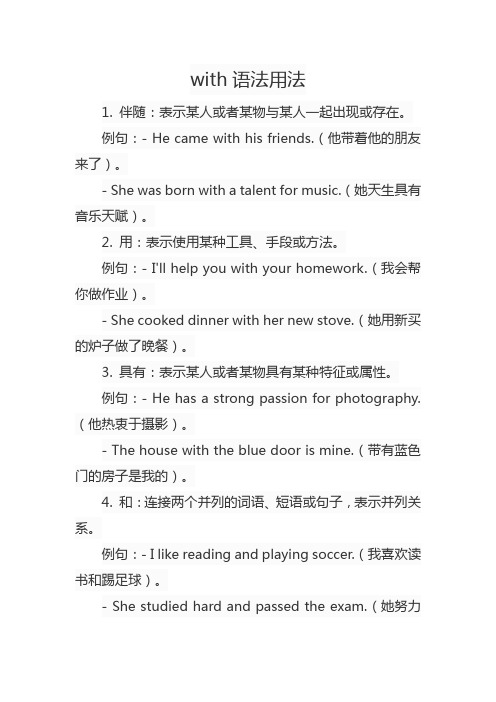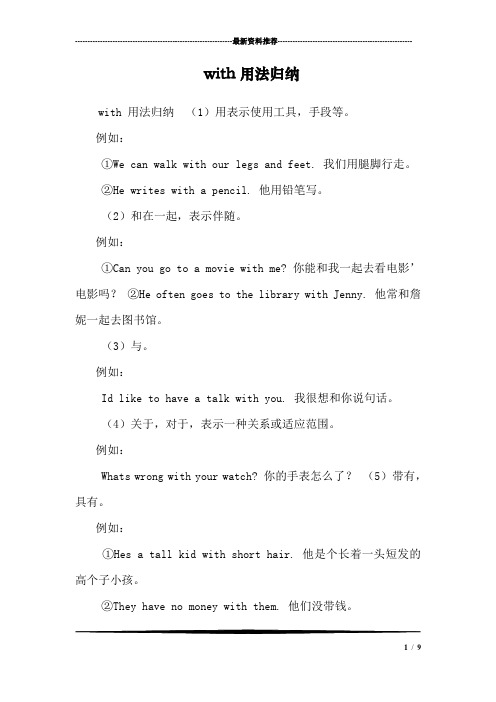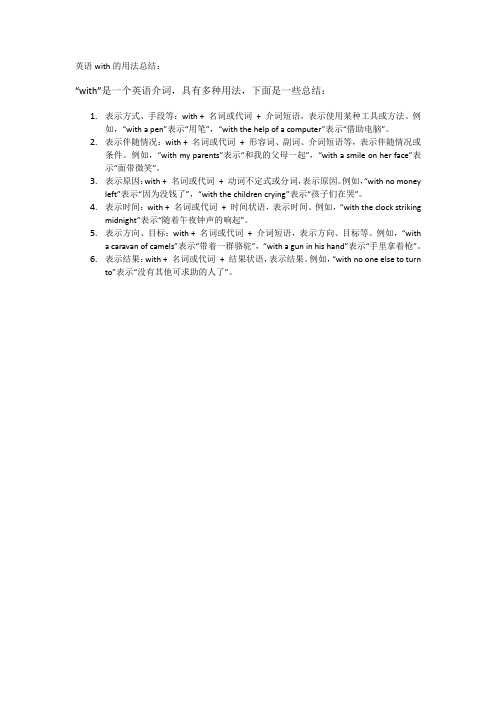with用法归纳
with用法归纳

"with"是一个常用的英语介词,它可以表示伴随、方式、原因、目的、结果等。
在不同的语境中,with的具体含义和用法也有所不同。
以下是with的一些常见用法归纳。
1. 表示伴随with在这个用法中,表示某人或某物与另一人或物在一起,或者某物是另一物的一部分。
例如:- She came in with her brother.(她和她哥哥一起进来。
)- The book is with the pen on the table.(书和笔在桌子上放在一起。
)2. 表示方式with在这个用法中,表示方式、手段或工具。
例如:- He cut the paper with scissors.(他用剪刀剪纸。
)- I can't open the door with this key.(我用这把钥匙打不开门。
)3. 表示原因with在这个用法中,表示原因、理由或动机。
例如:- With all the noise, I can't sleep.(由于所有的噪音,我睡不着。
)- She didn't come because with the flu.(她没来,因为她感冒了。
)4. 表示目的with在这个用法中,表示目的或目标。
例如:- He went to the store with the purpose of buying groceries.(他去商店的目的是买食品。
)- I'm going to the party with my friends.(我和朋友们去聚会。
)5. 表示结果with在这个用法中,表示某种行为或情况导致的结果。
例如:- She was so tired with all the work.(由于所有的工作,她非常累。
)- The house was completely destroyed with the fire.(房子在火灾中完全被毁了。
with用法大全

with用法大全with是一个常用的英语介词,它有多种用法,下面是with用法的大全:1. 表示伴随,即“和……一起”、“带着”、“随着”等意思,例如:- I went to the park with my friends.(我和我的朋友们一起去了公园。
)- She left the party with a smile on her face.(她带着微笑离开了派对。
)- With age comes wisdom.(随着年龄的增长,智慧也随之而来。
)2. 表示使用,即“用……”、“以……方式”等意思,例如:- I wrote the letter with a pen.(我用钢笔写了这封信。
)- He spoke with a heavy accent.(他带着浓重的口音说话。
)3. 表示原因,即“由于”、“因为”等意思,例如:- With all due respect, I disagree with your opinion.(恕我直言,我不同意你的观点。
)- With the weather being so bad, we decided to stay indoors.(由于天气太糟糕,我们决定呆在室内。
)4. 表示附带条件,即“带有”、“附带”等意思,例如:- The car comes with a full tank of gas.(这辆车带有满满一箱油。
)- The package comes with a free gift.(这个包裹附带一份免费礼品。
)5. 表示比较,即“和……一样”、“跟……比较”等意思,例如:- She is tall with her sister.(跟她姐姐一样,她也很高。
)- The new model is faster with better fuel efficiency. (新款车型比旧款车型更快,油耗更低。
)6. 表示时间,即“在……期间”、“在……时候”等意思,例如:- With each passing day, I miss you more.(随着每一天的过去,我越来越想念你。
with的六种用法例句

with的六种用法例句"with"在英语中有多种用法,下面是六种常见的用法,并附上例句:1. 表达伴随关系:- I went to the party with my friends.(我和我的朋友一起去了派对。
)- She enjoys hiking with her dog.(她喜欢带着她的狗一起徒步旅行。
)2. 表达具备某种特征或属性:- He is a teacher with a lot of experience.(他是一位经验丰富的教师。
)- She is a singer with a beautiful voice.(她是一位声音优美的歌手。
)3. 表达用某种方式或工具:- Cut the vegetables with a sharp knife.(用一把锋利的刀切蔬菜。
) - She painted the picture with watercolors.(她用水彩画了这幅画。
)4. 表达具有某种情感或状态:- He greeted me with a warm smile.(他带着热情的微笑向我打招呼。
) - She looked at him with suspicion.(她带着怀疑的目光看着他。
)5. 表达在某个时间或地点:- I will meet you with the park entrance.(我在公园门口和你见面。
) - Let's have lunch with the cafeteria.(我们在食堂吃午餐吧。
)6. 表达按照某种标准或规则:- He won the race with a new record.(他以新的纪录赢得了比赛。
) - She solved the math problem with the correct formula.(她用正确的公式解了这个数学问题。
)这些例句展示了"with"在不同语境下的用法,希望可以帮助你更好地理解和运用这个词。
with语法用法

with语法用法1. 伴随:表示某人或者某物与某人一起出现或存在。
例句:- He came with his friends.(他带着他的朋友来了)。
- She was born with a talent for music.(她天生具有音乐天赋)。
2. 用:表示使用某种工具、手段或方法。
例句:- I'll help you with your homework.(我会帮你做作业)。
- She cooked dinner with her new stove.(她用新买的炉子做了晚餐)。
3. 具有:表示某人或者某物具有某种特征或属性。
例句:- He has a strong passion for photography.(他热衷于摄影)。
- The house with the blue door is mine.(带有蓝色门的房子是我的)。
4. 和:连接两个并列的词语、短语或句子,表示并列关系。
例句:- I like reading and playing soccer.(我喜欢读书和踢足球)。
- She studied hard and passed the exam.(她努力学习并通过了考试)。
5. 随着:表示随着时间、顺序或某个过程的发展。
例句:- The sun sets with the evening.(随着傍晚,太阳下山了)。
- He grew older with the years.(随着年龄的增长,他变老了)。
6. 关于:表示与某人、某事或某种情况有关。
例句:- We had a discussion about the project.(我们讨论了关于这个项目的事情)。
- She is very knowledgeable about history.(她对历史很了解)。
7. 跟:表示跟随某人或者某物。
例句:- He followed her with his eyes.(他目送她离开)。
with的用法总结(通用8篇)

with的用法总结with的用法总结(通用8篇)总结是把一定阶段内的有关情况分析研究,做出有指导性的经验方法以及结论的书面材料,它能帮我们理顺知识结构,突出重点,突破难点,因此好好准备一份总结吧。
那么总结要注意有什么内容呢?以下是小编收集整理的with的用法总结,欢迎阅读与收藏。
with的用法总结篇1一、with或without+名词/代词+形容词例句:1.I like to sleep with the windows open.我喜欢把窗户开着睡觉。
(伴随情况)2.With the weather so close and stuffy, ten to one itll rain presently.大气这样闷,十之_要下雨(原因状语)二、with或without+名词/代词+副词例句:1.She left the room with all the lights on.她离开了房间,灯还亮着。
(伴随情况)2.The boy stood there with his head down.这个男孩低头站在那儿。
(伴随情况)三、with或without+名词/代词+介词短语例句:1.He walked into the dark street with a stick in his hand.他走进黑暗的街道时手里拿着根棍子。
(伴随情况)2.With the children at school, we cant take our vacation when we want to.由于孩子们在上学,所以当我们想度假时而不能去度假。
(原因状语)四、with或without+名词/代词+非谓语动词1、with或without+名词/代词+动词不定式,此时,不定式表示将发生的动作。
例句:1.With no one to talk to, John felt miserable.由于没人可以说话的人,约翰感到很悲哀。
with用法归纳

---------------------------------------------------------------最新资料推荐------------------------------------------------------with用法归纳with 用法归纳(1)用表示使用工具,手段等。
例如:①We can walk with our legs and feet. 我们用腿脚行走。
②He writes with a pencil. 他用铅笔写。
(2)和在一起,表示伴随。
例如:①Can you go to a movie with me? 你能和我一起去看电影’电影吗?②He often goes to the library with Je nny. 他常和詹妮一起去图书馆。
(3)与。
例如:Id like to have a talk with you. 我很想和你说句话。
(4)关于,对于,表示一种关系或适应范围。
例如:Whats wrong with your watch? 你的手表怎么了?(5)带有,具有。
例如:①Hes a tall kid with short hair. 他是个长着一头短发的高个子小孩。
②They have no m oney with them. 他们没带钱。
1 / 9(6)在方面。
例如:Kate helps me with my English. 凯特帮我学英语。
(7)随着,与同时。
例如:With these words, he left the room. 说完这些话,他离开了房间。
[解题过程] with 结构也称为 with 复合结构。
是由 with+复合宾语组成。
常在句中做状语,表示谓语动作发生的伴随情况、时间、原因、方式等。
其构成有下列几种情形:1.with+名词(或代词)+现在分词此时,现在分词和前面的名词或代词是逻辑上的主谓关系。
例如:1)With prices going up so fast, we can’t afford luxuries. 由于物价上涨很快,我们买不起高档商品。
with短语用法

with短语用法
"with"是一个常用的介词,在英语中有很多短语用法,下面列举一些常见的用法:
1. with + 名词+ 形容词:表示“具有……特征的”,如:
a book with a red cover(有红色封面的书)。
2. with + 名词+ 介词短语:表示“用……”,如:write with a pen(用笔写字)。
3. with + 名词+ 副词:表示“用……方法”,如:cook with oil(用油烹饪)。
4. with + 名词+ 名词:表示“和……一起”,如:go out with friends(和朋友一起出去)。
5. with + 名词+ 动词过去分词:表示“拥有……的”,如:
a house with a garden(有花园的房子)。
6. with + 名词+ 介词短语+ 动词不定式:表示“用……做……”,如:write with a pen to make a list(用笔写下清单)。
7. with + 名词+ 介词短语+ 动名词:表示“用……做……”,如:play with a ball(用球玩)。
8. with + 名词+ 副词+ 动词不定式:表示“用……方式做……”,如:speak with confidence(用自信的方式说话)。
“with”短语在英语中有很多用法,需要根据具体的语
境和句子结构来理解。
英语with的用法总结

英语with的用法总结:
“with”是一个英语介词,具有多种用法,下面是一些总结:
1.表示方式、手段等:with + 名词或代词+ 介词短语,表示使用某种工具或方法。
例
如,“with a pen”表示“用笔”,“with the help of a computer”表示“借助电脑”。
2.表示伴随情况:with + 名词或代词+ 形容词、副词、介词短语等,表示伴随情况或
条件。
例如,“with my parents”表示“和我的父母一起”,“with a smile on her face”表示“面带微笑”。
3.表示原因:with + 名词或代词+ 动词不定式或分词,表示原因。
例如,“with no money
left”表示“因为没钱了”,“with the children crying”表示“孩子们在哭”。
4.表示时间:with + 名词或代词+ 时间状语,表示时间。
例如,“with the clock striking
midnight”表示“随着午夜钟声的响起”。
5.表示方向、目标:with + 名词或代词+ 介词短语,表示方向、目标等。
例如,“with
a caravan of camels”表示“带着一群骆驼”,“with a gun in his hand”表示“手里拿着枪”。
6.表示结果:with + 名词或代词+ 结果状语,表示结果。
例如,“with no one else to turn
to”表示“没有其他可求助的人了”。
- 1、下载文档前请自行甄别文档内容的完整性,平台不提供额外的编辑、内容补充、找答案等附加服务。
- 2、"仅部分预览"的文档,不可在线预览部分如存在完整性等问题,可反馈申请退款(可完整预览的文档不适用该条件!)。
- 3、如文档侵犯您的权益,请联系客服反馈,我们会尽快为您处理(人工客服工作时间:9:00-18:30)。
with用法归纳(1)“用……”表示使用工具,手段等。
例如:①We can walk with our legs and feet. 我们用腿脚行走。
②He writes with a pencil. 他用铅笔写。
(2)“和……在一起”,表示伴随。
例如:①Can you go to a movie with me? 你能和我一起去看电影'>电影吗?②He often goes to the library with Jenny. 他常和詹妮一起去图书馆。
(3)“与……”。
例如:I’d like to have a talk with you. 我很想和你说句话。
(4)“关于,对于”,表示一种关系或适应范围。
例如:What’s wrong with your watch? 你的手表怎么了?(5)“带有,具有”。
例如:①He’s a tall kid with short hair. 他是个长着一头短发的高个子小孩。
②They have no money with them. 他们没带钱。
(6)“在……方面”。
例如:Kate helps me with my English. 凯特帮我学英语。
(7)“随着,与……同时”。
例如:With these words, he left the room. 说完这些话,他离开了房间。
[解题过程]with结构也称为with复合结构。
是由with+复合宾语组成。
常在句中做状语,表示谓语动作发生的伴随情况、时间、原因、方式等。
其构成有下列几种情形:1.with+名词(或代词)+现在分词此时,现在分词和前面的名词或代词是逻辑上的主谓关系。
例如:1)With prices going up so fast, we can't afford luxuries.由于物价上涨很快,我们买不起高档商品。
(原因状语)2)With the crowds cheering, they drove to the palace.在人群的欢呼声中,他们驱车来到皇宫。
(伴随情况)2.with+名词(或代词)+过去分词此时,过去分词和前面的名词或代词是逻辑上的动宾关系。
例如:1)I sat in my room for a few minutes with my eyes fixed on the ceiling.我在房间坐了一会儿,眼睛盯着天花板。
(伴随情况)2)She had to walk home with her bike stolen.自行车被偷,她只好步行回家。
(原因状语)3.with+名词(或代词)+形容词例如:1)I like to sleep with the windows open.我喜欢把窗户开着睡觉。
(伴随情况)2)With the weather so close and stuffy, ten to one it'll rain presently.大气这样闷,十之八九要下雨。
(原因状语)4.with+名词(或代词)+介词短语例如:1)With the children at school, we can't take our vacation when we want to.由于孩子们在上学,所以当我们想度假时而不能去度假。
(原因状语)2)The soldier had him stand with his back to his father.士兵让他背朝着他的父亲站在那儿。
(行为方式)5.with+名词(或代词)+副词例如:1)He fell asleep with the light on.他睡着了,灯还亮着。
(伴随情况)2)The boy stood there with his head down.这个男孩低头站在那儿。
(伴随情况)6.with+名词(或代词)+动词不定式此时,不定式表示将发生的动作。
例如:1)With no one to talk to, John felt miserable.由于没人可以说话的人,约翰感到很悲哀。
(原因状语)2)With a lot of work to do, he wasn't allowed to go out.因为还有很多工作要做,他没有被允许外出。
(原因状语)prep.1. 与...一起,偕同,和...She lives with her son.她和儿子住在一起。
2. 带着...;有...的The girl with long hair is my classmate.长头发的女孩是我同学。
3. 以(手段、材料),用(工具)My American friend is learning to eat with chopsticks.我的一位美国朋友在学着用筷子吃饭。
4. 符合,一致5. 在...一边,赞成We are with you there.在那一点上我们站在你这一边。
6. 跟...,反对The Allied Forces fought with Germany.盟军跟德国交战。
7. 顺...方向,跟...一起8. 加上,包括...在内His bank savings, with his wife's jewels, amount to three million dollars. 他的银行存款加上他太太的首饰合计达三百万元。
9. 随着,对应An independent man, Peter never goes with the tide.彼得是个有主见的人,从不随大流。
10. 在...身边,在...身上He had a gun with him.他带了枪。
I have no money with me.我身边没有钱。
11. 与...(相比)12. 跟...(分手)I parted with my brother in Paris.我跟我兄弟在巴黎分手。
13. 尽管有With all the setbacks, he did not lose heart.尽管遭受种种挫折,他没有丧失信心。
14. 由于,因为They were wild with joy.他们欣喜若狂。
15. (与副词连用构成祈使句,表示强烈的愿望) Down with fascism!打倒法西斯主义!with comparatives afterthanior with superlatives 与比较级的词连用,置于filled with or attended with.充满或者伴随着……。
provide with or construct with studs.提供饰纽或用饰纽来构建。
To live with me留在我的记忆之中acupuncture with cutaneous needle皮肤针疗法Along with the sunshine你拥有阳光,apparal with shell sets贝珠衣Assemble with supply parts来件装配balances outstanding with branches联行汇差Be compare with sth与。
相比较prep.同, 与, 和, 跟talk with a friend与朋友谈话learn farming with an old peasant跟老农学习种田fight [quarrel, argue] with sb.跟某人打架[争吵, 辩论][说明表示动作的词, 表示伴随]随着, 和...同时change with the temperature随着温度而变化increase with years逐年增加be up with the dawn黎明即起W-these words he left the room.他说完这些话便离开了房间。
[表示使用的工具, 手段]用defend the motherland with one's life用生命保卫祖国dig with a pick用镐挖掘cut meat with a knife用刀割肉[说明名词, 表示事物的附属部分或所具有的性质]具有; 带有; 加上; 包括...在内tea with sugar加糖的茶水a country with a long history历史悠久的国家[表示一致]在...一边, 与...一致; 拥护, 有利于vote with sb.投票赞成某人sympathize with sb.同情某人be with sb.赞成某人, 在某人一边[表示随身携带]在...身边Have you some money with you ?你(身上)带钱了吗?Take an umbrella with you.随身带把伞去。
[表示行为方式]以..., 带着Handle with care!小心轻放!with accuracy精确地with smile面带微笑地serve the people with one's whole heart全心全意地为人民服务[后面加复合宾语, 表示伴随关系]walk with a stick in one's hand手拿拐棍走路sleep with the window open开着窗睡觉[表示原因, 条件, 结果, 让步等关系]由于, 因为; 当(有)...情况下; 如果有; 虽然, 尽管jump with joy高兴得跳起来shake with cold冷得发抖She was dying with hunger.她饿得要死了。
W-all his money, he is unhappy.尽管他有那么多钱, 他也并不愉快。
对于, 关于, 就...来说They are friendly with us.他们对我们很友好。
We are pleased with the house.我们对这所房屋很满意。
It is day with us while it is night with them.对于我们此时是白天, 而对于他们则是夜晚。
[与副词连用, 构成祈使句]On with your shoes!穿上鞋!Off with your clothes!把衣服脱下来!Down with terrorism!打倒恐怖主义!prep.和…一起Misery acquaints men with strange bedfellows.(谚) 落难时不择伙伴。
to live with one's parents和父母同住staying with a friend和朋友在一起with her dog带着她的狗带有…的心情、态度等He agreed that he was wrong with a good grace.他很大方地承认自己错了。
